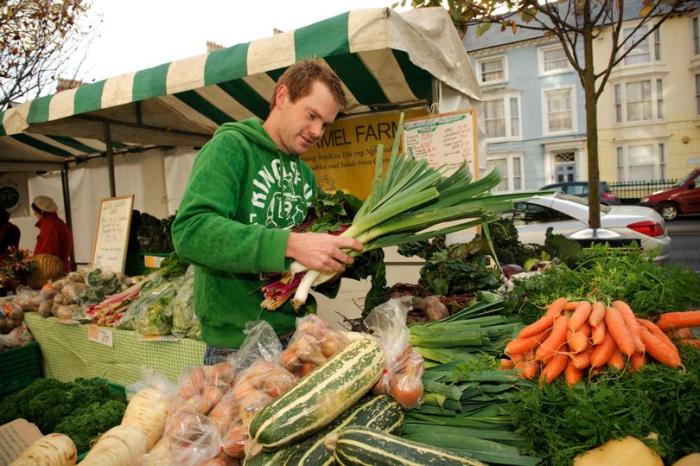Food - what's the problem?
Published: 26 May 2021

Aberystwyth Farmer's Market (Credit: Keith Thomas)
Farming is an important economic sector for the Welsh economy. But it is much more than that. Farming has a strong cultural importance for the nation. Many family-run farms have been in the family for generations and farming is the backbone for many communities. Almost 90% of land in Wales is farmland.
In the UK however, we only produce around 55% of the food we consume and here in Wales less than 0.1% of our land is used to grow vegetables.
The food we eat adds to our carbon footprint in a variety of ways.
The Committee on Climate Change states that agriculture emissions accounts for 14% of Wales emissions.
Whether we choose to eat meat or not, we all know the impacts that meat and dairy production (especially intensive systems) are having on our planet.
Scientists say avoiding meat and dairy products is the single biggest way to reduce our environmental impact on the planet.
Research shows that without meat and dairy consumption, global farmland use could be reduced by more than 75% – an area equivalent to the US, China, European Union and Australia combined – and still feed the world. Loss of wild areas to agriculture is the leading cause of the current mass extinction of wildlife.
In the UK, agriculture is also responsible for 83% of ammonia air pollution and 16% of water pollution.
Against this backdrop, it’s easy to see why many more people are opting for diets free from meat and dairy or switching to eating less and better meat and supporting good quality local producers instead of buying meat from cheap, intensively reared animals.
Project Drawdown estimates that:
‘If 50-75 percent of the world’s population restricts their diet to a healthy average 2,250 calories per day and reduces meat consumption overall, we estimate at least 43-68 gigatons of emissions could be avoided from dietary change alone. If avoided deforestation from land use change is included, an additional 21.8-23.5 gigatons of emissions could be avoided, making healthy, plant-rich diets one of the most impactful solutions at a total of 64.8-91.5 gigatons avoided’.
